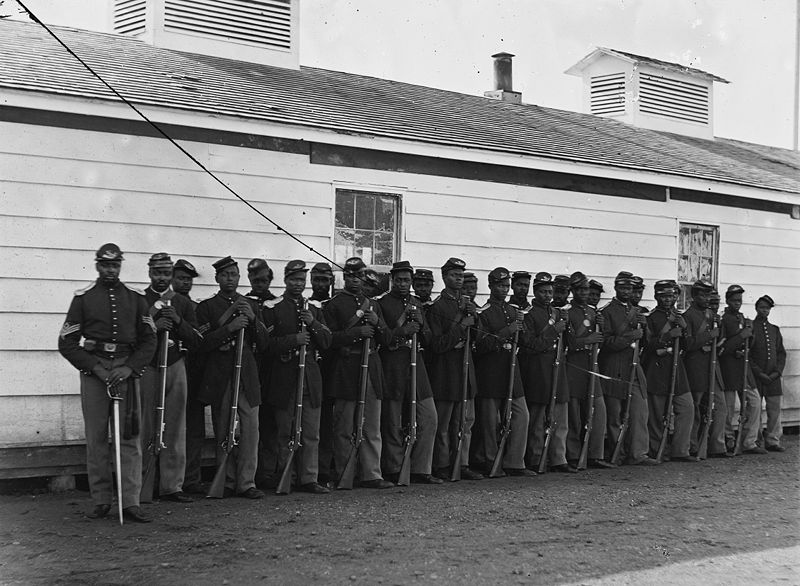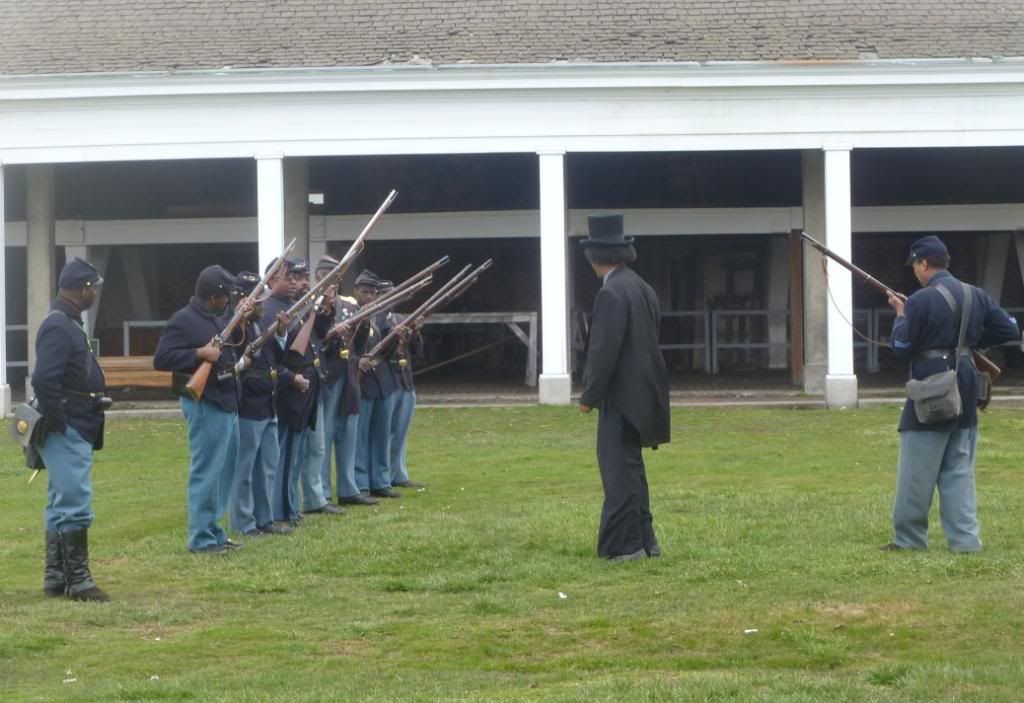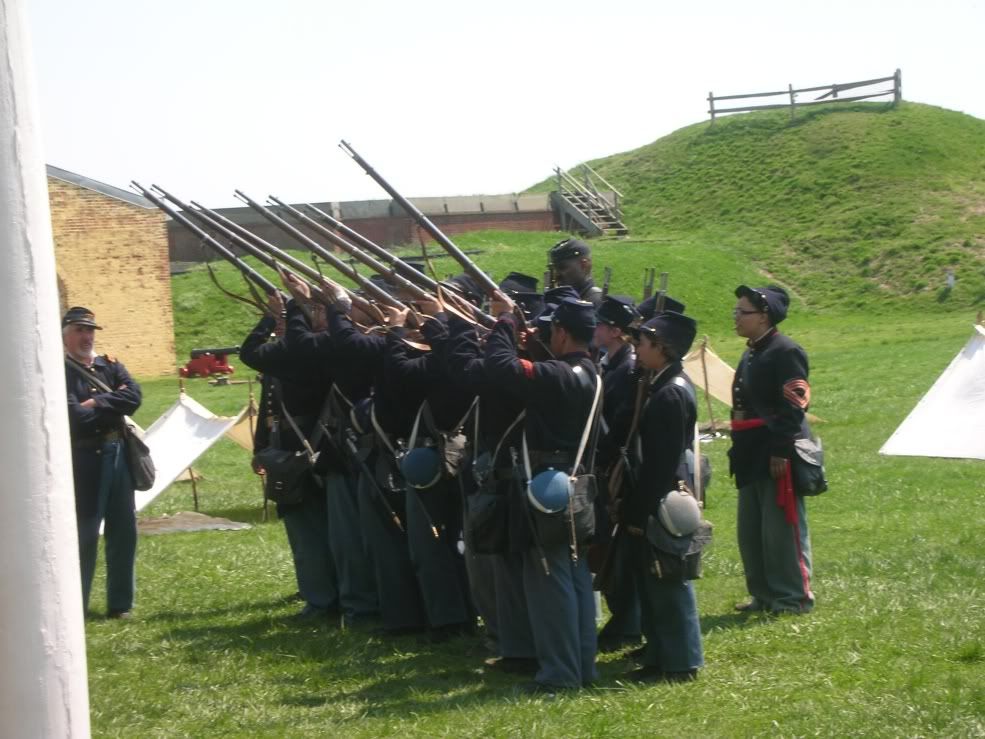Skip to comments.
Retraction For Our 1863 Editorial Calling Gettysburg Address 'Silly Remarks': Editorial
Patriots-News ^
| November 15, 2013
Posted on 11/15/2013 11:16:55 AM PST by nickcarraway
Seven score and ten years ago, the forefathers of this media institution brought forth to its audience a judgment so flawed, so tainted by hubris, so lacking in the perspective history would bring, that it cannot remain unaddressed in our archives.
We write today in reconsideration of “The Gettysburg Address,” delivered by then-President Abraham Lincoln in the midst of the greatest conflict seen on American soil. Our predecessors, perhaps under the influence of partisanship, or of strong drink, as was common in the profession at the time, called President Lincoln’s words “silly remarks,” deserving “a veil of oblivion,” apparently believing it an indifferent and altogether ordinary message, unremarkable in eloquence and uninspiring in its brevity.
CONNECT WITH US
On Twitter or Facebook:
• Like PennLive on Facebook
And check out our mobile site by visiting PennLive.com from any mobile browser.
In the fullness of time, we have come to a different conclusion. No mere utterance, then or now, could do justice to the soaring heights of language Mr. Lincoln reached that day. By today’s words alone, we cannot exalt, we cannot hallow, we cannot venerate this sacred text, for a grateful nation long ago came to view those words with reverence, without guidance from this chagrined member of the mainstream media.
The world will little note nor long remember our emendation of this institution’s record – but we must do as conscience demands:
TOPICS: Books/Literature; History; Local News
KEYWORDS: civilwar; gettysburg; lincoln
Navigation: use the links below to view more comments.
first previous 1-20, 21-40, 41-60, 61-80, 81-88 next last
To: donmeaker
donmeaker:
"file closers" Thanks, I can't recall ever seeing that word before.
No anecdote comes to mind relating to such people -- not in some American army, anyway.
Your example here of Pickett's charge suggests maybe "file closers" were not all that effective, when the chips were down.
Is there evidence of "file closers" in the Union Army?
If so, how were they used?
If not, why not?
61
posted on
11/18/2013 1:28:58 AM PST
by
BroJoeK
(a little historical perspective....)
To: onedoug; rockrr
onedoug:
"There are lots more." Of course, there is evidence that many slaves followed their masters to serve Confederate armies.
There are even occasional reports of slaves firing weapons at Union troops.
But there were no Confederate "colored troops" or units remotely similar to those 175 black regiments (178,000 troops) which served & fought for the Union, and of whom, all-told, 68,000 were casualties, including nearly 3,000 in combat.
Of those 178,000 Union Colored Troops, over half came from Confederate states and another 1/4 from Union slave-states (i.e., Kentucky, Maryland, Missouri).
22nd Regiment, US Colored Troops: "sic semper tyrannis" 
Sgt. Major Christian Fleetwood medal of honor winner:

Company E, 4th US Colored Troops at Fort Lincoln (DC), November 17th, 1865.

62
posted on
11/18/2013 2:00:59 AM PST
by
BroJoeK
(a little historical perspective....)
To: BroJoeK
Though far fewer Blacks today who would bear the Union Jack with pride
than their Confederate cousins who yet proudly hoist the Stars and Bars.
63
posted on
11/18/2013 6:44:41 AM PST
by
onedoug
To: BroJoeK
How do you explain the numerous first hand accounts from Yankee Officers and others of black rebel troops? Were they lying?
Frederick Douglass, Douglass’ Monthly, IV [Sept. 1861,] pp 516 – “there are at the present moment many colored men in the Confederate Army – as real soldiers, having muskets on their shoulders, and bullets in their pockets, ready to shoot down loyal troops, and do all that soldiers may do to destroy the Federal government…There were such soldiers at Manassas and they are probably there still.”
64
posted on
11/18/2013 6:53:40 AM PST
by
central_va
(I won't be reconstructed and I do not give a damn.)
To: BroJoeK
page 270] From James G. Bates’ letter to his father reprinted in the 1 May 1863 “Winchester [Indiana] Journal” [the 13th IVI ["Hoosier Regiment"] was involved in operations around the Suffolk, Virginia area in April-May 1863 ] – “I can assure you [Father,] of a certainty, that the rebels have negro soldiers in their army. One of their best sharp shooters, and the boldest of them all here is a negro. He dug himself a rifle pit last night [16 April 1863] just across the river and has been annoying our pickets opposite him very much to-day. You can see him plain enough with the naked eye, occasionally, to make sure that he is a “wooly-head,” and with a spy-glass there is no mistaking him.”
65
posted on
11/18/2013 6:58:53 AM PST
by
central_va
(I won't be reconstructed and I do not give a damn.)
To: BroJoeK
file closers were used in both armies, but they had different degrees of authority.
In the confederate army, they were directed to use deadly force. There were some regiments in the US Army where the regimental commander gave such orders, but they were not considered
To: BroJoeK
http://www.acws.co.uk/nl/nl0701/fileclosers.htm
Article on file closers.
Ordering file closers to shoot their own soldiers was not considered a good position to have on paper. Lee was unusual in that he put it on paper in his General Orders Number 4. Military Police were to apprehend deserters, not, not to shoot them.
Rather like the sad fact that the original major purpose of the Marines was to protect navy officers from the conscripted or impressed enlisted men. Once the volunteer navy happened, that purpose for the Marines was much diminished.
To: central_va
Black rebels were servants, often the half brothers of serving soldiers. An exceptional example, Lee had 4 servants who accompanied him.
As members of the family, (though members with a patch) they were often send by their master to perform unpleasant tasks. Digging was an unpleasant task, and the servants were often sent to perform it. Lee was called “The Ace of Spades” because he had large numbers of black slaves entrench Richmond. Other mixed race persons were treated as white.
North Carolina was a special case. Black freedmen were permittted to vote until 1835, and free mixed race soldiers were provided to the confederate forces by that state. They were very successful.
After the war, Jim Crow took over the south. Mixed race soldiers who had served honorably had their records altered to deny them pensions or credit. That was done by southern clerks for contemporary political reasons, (that is, not having to do with the character of the service at the time rendered, but to do with the politics at the time that the changes to their records were made.)
To: central_va
Black rebels were servants, often the half brothers of serving soldiers. An exceptional example, Lee had 4 servants who accompanied him.
As members of the family, (though members with a patch) they were often send by their master to perform unpleasant tasks. Digging was an unpleasant task, and the servants were often sent to perform it. Lee was called “The Ace of Spades” because he had large numbers of black slaves entrench Richmond. Other mixed race persons were treated as white.
North Carolina was a special case. Black freedmen were permittted to vote until 1835, and free mixed race soldiers were provided to the confederate forces by that state. They were very successful.
After the war, Jim Crow took over the south. Mixed race soldiers who had served honorably had their records altered to deny them pensions or credit. That was done by southern clerks for contemporary political reasons, (that is, not having to do with the character of the service at the time rendered, but to do with the politics at the time that the changes to their records were made.)
To: central_va
Sorry about the double post.
F. Douglass probably had reports, but himself was never in a Civil War battle, IIRC his career.
To: donmeaker
Confederates did not authorized deadly force for their file closers until VERY late in the war, i.e. the last 2 months.
71
posted on
11/18/2013 11:55:27 AM PST
by
central_va
(I won't be reconstructed and I do not give a damn.)
To: central_va
I disagree. I will agree that most officers had the good taste not to put it in writing.
Lee didn’t have that degree of restraint, at that time. He was trying to overcome the big battalions with greater discipline. That may be a mark of his desperation, or a mark of the practice filtering upward as successful unit commanders got promoted.
Early in the war Pickett had a tiff with Jackson, to keep Jackson from shooting his stragglers.
Jackson: Gen Pickett, why do I find so many stragglers behind your division today?
Pickett: Perhaps, General, it is because you are following my division today.
Jackson was a magnificent marcher of men. He was one of the early promoters of the ‘file closers will shoot stragglers’ rule. It is an irony of the war that Jackson was shot by his own men. Martinet, a French officer known for his harsh discipline, was also shot by his own men.
That rule was also promulgated by some US Army officers. Most had the good taste not to talk about it. I have only been able to find one US Army regimental officer who bragged about his file closers shooting stragglers.
Flogging had been abolished from the Army prior to the civil war.
To: central_va
The testimony of many confederate soldiers suggests you are incorrect.
To: central_va
“It was probably 3 o’clock or later in the afternoon when the cannon fire of the enemy ceased. General Pickett went to Longstreet and asked if he should make the charge according to the orders issued. He (Longstreet) did not reply by word of mouth. He simply nodded. We were ordered to fix bayonets. The Colonel spoke to us. ‘See that wall there; it is full of Yankees: I want you to help take it.’
He told the file-closers to see that all the men kept up, and if any lagged shoot them, or he would have the file-closers themselves shot. Just before we reached the Emmitsburg Road a shell killed three and wounded three, a loss of six out of my company of only 25. Our pace was regular time.
Regarding Pickett's charge at gettysburg.
To: donmeaker
So no Union General ever said such a thing...
75
posted on
11/19/2013 1:24:51 AM PST
by
central_va
(I won't be reconstructed and I do not give a damn.)
To: donmeaker
Most men LIKED file closers because most of the men, both sides, did not straggle. If they had to go on the forced 20 mile march then everyone needs to keep up. File closers are an ugly legacy of the Civil War. It was not just a Confederate thing though they probably invented it.
76
posted on
11/19/2013 1:30:29 AM PST
by
central_va
(I won't be reconstructed and I do not give a damn.)
To: central_va
I have not found any Union general directing file closers to shoot men for straggling. I am not sure such does not exist. I have found no US Army counterpart to Lee’s Gen Order number 4 with its circular.
To: donmeaker
I have not found any Union general directing file closers to shoot men for straggling. I am not sure such does not exist. I have found no US Army counterpart to Lee’s Gen Order number 4 with its circular.I can believe that. I would not have wanted to be in one of Jackson's Corps forced marches, heck every one of his marches were probably forced i.e. > 15 miles and file closers taking up the rear in but in front of the baggage train.
From what I have read it was a good day when a regiment was reassigned out of Jackson's Corps. Celebrating was in order ....
78
posted on
11/19/2013 10:54:13 AM PST
by
central_va
(I won't be reconstructed and I do not give a damn.)
To: central_va
I am sure some men did like file closers. Some men (there are always some) wanted to be file closers because they liked the lower risk from the enemy.
I don’t see how anyone can assert ‘most’ liked or didn’t like them. That would require a survey that we just can’t do now. All we can do is read what we can and emote.
If you read Audie Murphy’s “To Hell and Back” a feature of WWII infantry is the continual assessment of risk, and the ability to go to ground when an advance is not reasonably possible, and the ability to withdraw from positions that can not be held. File closers could delay that kind of decision, but despite file closers, the very brave rebel soldiers at Gettysburg fell back from Little Round Top, from the Stone Wall, from Culp’s Hill.
In like manner, US Army soldiers suffered even higher loss rates at Gold Harbor than Pickett’s Charge or Hood’s men at Franklin.
Different men will come to different conclusions at different times in combat. Audie Murphy was secure enough to describe combat in Italy when he and his squad bugged out of a bad position. Another time he purposefully exposed himself, so that any Germans would fire on him at long distance, and be likely to miss. Effective and experienced soldiers think they have some skill in assessing risk in battle. I can think of no better way to destroy the morale of such soldiers than to deny them the freedom to act on that experience, and to threaten to shoot them down. Experienced men as file closers were also under threat of being shot, and so, though they had reduced risk from the enemy, they were still at risk of being killed by the pretended leaders of the insurrection.
To: onedoug; central_va; donmeaker
onedoug:
"Though far fewer Blacks today who would bear the Union Jack with pride than their Confederate cousins who yet proudly hoist the Stars and Bars." Oh, well, then if you say so...
But don't tell these people, might be trouble...



80
posted on
11/20/2013 11:59:54 AM PST
by
BroJoeK
(a little historical perspective....)
Navigation: use the links below to view more comments.
first previous 1-20, 21-40, 41-60, 61-80, 81-88 next last
Disclaimer:
Opinions posted on Free Republic are those of the individual
posters and do not necessarily represent the opinion of Free Republic or its
management. All materials posted herein are protected by copyright law and the
exemption for fair use of copyrighted works.
FreeRepublic.com is powered by software copyright 2000-2008 John Robinson





